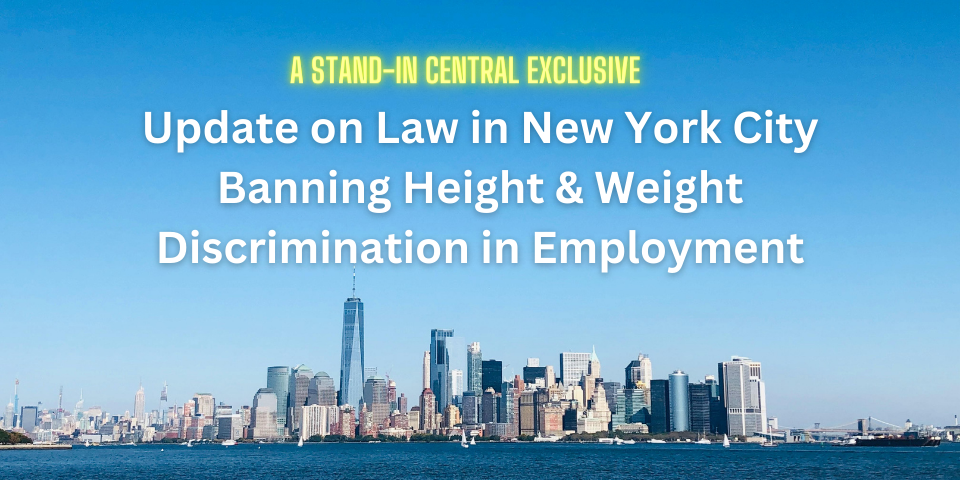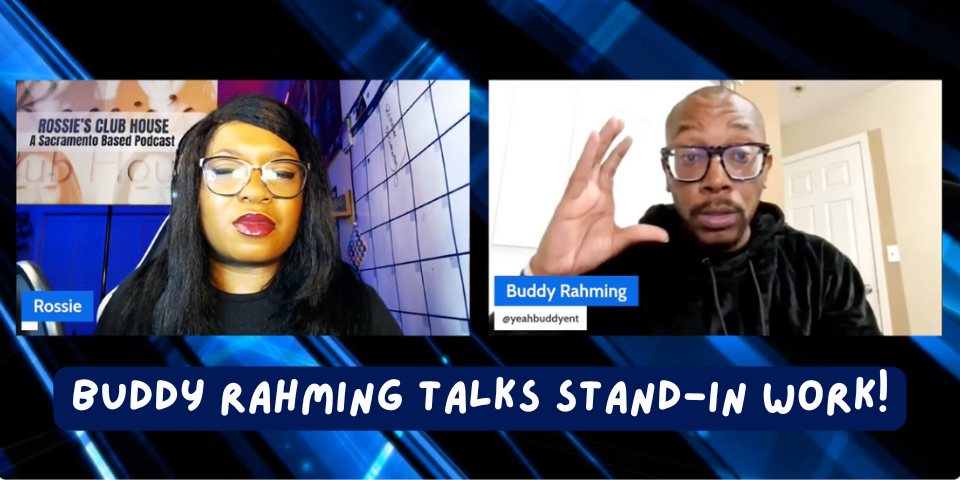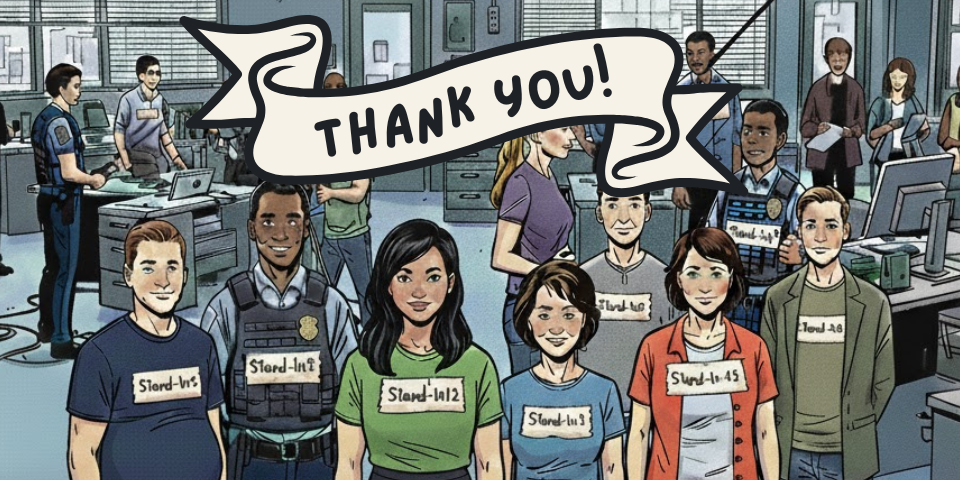If you have worked as a stand-in on New York City jobs, or even as a background actor, you are familiar with casting notices asking for the applicant’s height and/or weight. For example, a recent casting notice emailed out for “NYC area” stand-in work stated:
PLEASE NOTE: height, weight, and relevant stand in experience.
Recently, you may have started to see some job postings and casting notices starting to make strange new disclosures about casting’s or production’s height and weight requests. For example, a recent casting notice emailed out for NYC work as a background actor stated, preceded by not one but two asterisks:
“**Height, weight, and clothing sizes are used for costuming purposes only, unless needed for the casting of stand-ins or photodoubles.
More than likely, these new disclosures relate to New York City’s new law around height and weight discrimination.
As you recall, back in May and June 2023, Stand-In Central covered the topic of New York City’s ban on height and weight discrimination in employment. NYC Mayor Eric Adams signed the ban into law on May 26th, 2023, and the law was to go into effect on November 22, 2023 but apparently took effect on November 26, 2023.
The NYC City Council website summarized the bill, now law, in this way:
This bill would prohibit discrimination on the basis of a person’s height or weight in employment, housing, and public accommodations. This bill would also create an exemption for employers needing to consider height or weight in employment decisions only where required by federal, state, or local laws or regulations or where the Commission on Human Rights permits such considerations because height or weight may prevent a person from performing essential requirements of a job and no alternative is available or this criteria is reasonably necessary for the normal operation of the business. This bill would similarly permit consideration of height or weight by operators or providers of public accommodations. Covered entities under this law would have an affirmative defense that their actions based on a person’s height or weight were reasonably necessary for normal operations.
Although the law bans height and weight discrimination in employment, much of the finer details about the implementation of the law have been left to the New York city Commission on Human Rights. As of the publication date of this article, there does not seem to be published the rules and regulations surrounding this new law. However, the Commission has released some information. Furthermore, the Commission permits petitions for the adoption of rules.
Want more information? And where does Stand-In Central stand in all of this? Let’s find out.
Stand-In Central’s Position
Given job postings and casting notices for stand-ins often include height requests (and sometimes weight requests), the question of how the new law applies to employer conduct in hiring stand-ins comes into focus:
- Is it lawful or unlawful to request the height (or weight) of a stand-in?
- If it is lawful or unlawful, is it so categorically (i.e., always), or on a case-by-case basis?
The law did not make answers to these questions clear, especially when considering sometimes stand-ins grossly mismatch the height (weight) of the actors for whom they stand in, meaning height (weight) requests may be found to be discriminatory under the new law. So, the Editor of Stand-In Central wrote a petition to the Commission on September 22, 2023, for it to consider the adoption of a rule:
Dear Ms. Palma:
Thank you for your service promoting and protecting the rights of individuals and groups in New York City who face discrimination in employment because of who they are.
My name is Ben Hauck. I am a resident of New York City. I frequently work as a stand-in on film and television productions shot in New York City. I also own the website Stand-In Central (standincentral.com), founded in 2010, providing information about the jobs of television and film stand-ins.
I write to petition you to consider the adoption of a rule.
The purpose of this rule is to protect the human rights of those people who work as stand-ins in the entertainment industry in New York City, in light of legislation Mayor Eric Adams signed on May 26, 2023, set to take effect in two months on November 22. This law, Intro. No. 209-A, amended New York City Human Rights Law (NYCHRL) by adding height (and weight) to the list of protected characteristics upon which employers must not discriminate.
A stand-in is a person hired to serve a still and motion picture production by aiding its production crew in serving as the subject of lights, cameras, rehearsals, etc., before photography and/or filming of the principal talent. Stand-ins effectively “stand in” for principal talent before a scene is shot, so that the principal talent do not need to spend long hours on set, and so that they can prepare in hair, makeup, and wardrobe departments.
Stand-ins often share similarities in physical characteristics between themselves and the principal talent for whom they stand in—but they do not always. Many stand-ins look dissimilar to their principal talent. In the case of a “utility” stand-in, this person on a given work day or over a range of work days may stand in for multiple actors who oftentimes have widely different physical characteristics from the utility stand-in, such as widely different height, weight, age, race, color, gender, etc. For example, on a given day, a female utility stand-in with blond hair may stand in for actors with red and black hair, lighter and darker skin tones, taller and shorter heights, children and adults, male actors, et al.
Not all stand-in work requires stand-ins to be an exact or close physical match to the principal talent for whom they stand in. However, stand-ins are routinely hired after a casting office solicits or otherwise considers their height information, often through use of a posting on a casting website to facilitate hiring of stand-ins and other similar talent. Frequently, weight or other bodily characteristics are also considered in hiring stand-ins.
The rule I propose here would serve to identify the problem of height (and weight) discrimination in the hiring of stand-ins and serve to curtail it. The language I propose for the rule is:
| No employer, or employment agency such as a casting office, or any employee or agent thereof, such as a business providing a website or application to facilitate casting or hiring for employers or employment agencies, may solicit, review, promote, or otherwise consider the height or weight of any person in a submission, invitation for submission, or otherwise an application or hiring for stand-in work in a still or motion picture production,
(a) except when the height or weight requirement is permitted by an affirmative defense that 1) the person’s height or weight is an essential requisite for the specific stand-in job, and 2) there is no alternative the covered entity could reasonably take that would allow the person to perform the essential requisites of the specific stand-in job, and 3) the covered entity documents for applicants in advance of hiring the reason or reasons the height or weight is essential and required for the job on the specific production; or (b) except when the covered entity’s decision based on height or weight criteria is reasonably necessary for the execution of the normal operations of such covered entity, and the covered entity documents for applicants in advance of hiring the reason or reasons a different height or weight would actually interfere with the execution of the normal operations of the covered entity. |
Adoption of this rule would serve the mission of Intro. No. 209-A and the NYCHRL generally by prohibiting much of the discrimination on the basis of height (and weight) that stand-ins commonly face, which is usually based on preferences around height (or weight) rather than essential requirements. Anecdotally from over more than a decade of stand-in work, stand-in height and weight considerations are essential and required only in limited production circumstances, and productions can easily correct discrepancies between the heights (or weights) between stand-ins and principal talent through the use of simple solutions (e.g., wearing different footwear or standing on appleboxes), or by common, minor adjustments by a production crew after setting up a shot with a stand-in.
The rule I propose aims to ensure that casting offices that work for productions that employ stand-ins either do not solicit for height or weight information when posting jobs on casting websites for stand-ins, or document their reasons for soliciting such information (for later investigation, if necessary). The proposed rule also aims to ensure that casting websites or casting apps do not serve height (or weight) information of applicants to casting directors seeking to hire stand-ins unless this information is essential, required, reasoned, and so documented to applicants.
As for additional considerations, in order to address height (or weight) considerations of stand-ins in their employment, the Commission may choose, instead of adopting a rule, to adopt a regulation identifying stand-in work on a still or motion picture production as a job (or this kind of stand-in as a category of jobs) for which consideration of height or weight criteria is reasonably necessary for the execution of the normal operations of the production. I would strongly discourage the Commission from doing so.
Stand-in work is so varied that only some jobs make height (or weight) an essential requirement, and only on some days of work height (or weight) may not be essential or required of stand-ins. Effectively, especially given the use of utility stand-ins in productions, stand-in work is not suitable for Commission categorization, or else the Commission would serve to further the discrimination in employment stand-ins face around protected characteristics such as height (or weight).
Aside from the NYCHRL, I am not aware of any laws or regulations that may necessitate this rule, nor any laws or regulations that may create a potential issue of preemption or could otherwise implicate the application of the rule.
Please contact me using any of the following contact information to request any supplemental or additional information helpful for making a determination.
Thank you for your consideration of my petition.
The NYC Commission on Human Rights has practices and procedures for handing petitions. Its website lists Section 1-102, “Commission Procedures for Considering and Responding to Petitions for Rulemaking.”
Under that section at (c), the website states, “The Commission has full discretion to grant or deny any portion of a petition for proposed rulemaking and may amend or modify the petition’s proposed language. If any portion of a petition is approved by the Commission for future rulemaking, the Commission will provide the petitioner with a non-binding estimate of the timeframe for the proposed rule’s publication. If a petition is denied in full, the Commission will take no further action.”
With respect to timing of determinations, at (b) the website states, “If a petition is submitted in proper form, as required by § 1-101, the Commission will provide written notice of its determination on the petition within 60 days from the date of receipt of the petition […]”
Given the Editor submitted the above letter on September 22, then come November 22 (the original day the law was to go into effect) was around 60 days from submission of the petition, likely in proper form. However, the Editor received no determination by 60 days after submission. Without a determination from the NYCHR come December 19, the Editor wrote the Commission again:
Dear Ms. Palma:
Thank you for your service promoting and protecting the rights of individuals and groups in New York City who face discrimination in employment because of who they are.
On September 22, 2023, I mailed you a letter (copy enclosed) petitioning you when what I believed to be proper form to consider the adoption of a rule. The purpose of this rule was to protect the human rights of those people who work as stand-ins in the entertainment industry in New York City, in light of legislation Mayor Eric Adams signed on May 26, which took effect on or around November 22.
Under the Official Rules of the Commission on Human Rights at Subchapter K, §1-102(b), “Commission Procedures for Considering and Responding to Petitions for Rulemaking: Timing of determinations,” I would have expected to receive written notice of the Commission’s determination on the petition within 60 days of the Commission’s receipt of the petition, since the Commission did not request from me supplemental information. So, I would have expected to receive such written notice on or around November 22.
Nearly 90 days have passed without any written notice from the Commission of a determination on my petition. Please update me on the status of my petition using any of the following contact information.
On February 16, 2024, the Editor received an email from the Commission under the subject line, “Response to Proposed Rule.” The “Policy Team” wrote:
Hello Mr. Hauck,
Thank you for submitting a rule proposal regarding the NYC Human Rights Law and its relationship to those working in the acting and entertainment sector. As you know, the NYC Human Rights Law was amended in November 2023 to add height and weight as protected categories. The Commission on Human Rights has considered your proposed rule. Please be aware that the Commission declines to adopt your rule proposal as drafted but the Commission will continue to consider your proposal as we develop draft rules. The Commission expects to issue proposed rules for public comment later this calendar year.
If you wish to contact the Commission with a specific proposed change to the Commission’s rules in the future, you are welcome to do so pursuant to 47 RCNY § 1-101.
Note that the Policy Team at the Commission wrote, “The Commission expects to issue proposed rules for public comment later this calendar year.”
So, based on this information, the public (and stand-ins specifically) may expect to hear at some time in 2024 whether requests for their height (or weight) in hiring them are lawful or unlawful, or when they might be found so.
Additional Insights in the NYC Body Discrimination Ban
Law360 ran an article on December 5, 2023, titled “NYC Official Answers Queries About New Body Size Bias Ban.” The article consisted of an interview with JoAnn Kamuf Ward, the deputy commissioner of policy and external affairs at the Commission.”
According to the article, Kamuf Ward said that “there’s no formal deadline for issuing the draft rules, which will have the force of law, but the agency is aiming for the first quarter of 2024.” The article also states that according to Kamuf Ward, “The draft rules will be followed by a public notice-and-comment period and a final version.”
The article includes this interesting exchange the journalist (boldface) had with Kamuf Ward (plain text):
You mentioned earlier providing in the rules examples of areas where an employer may lawfully consider someone’s height or weight. You said you’re probably not going to exempt whole industries or professions — you won’t carve out all firefighters, all police officers?
I think that’s pretty unlikely. Just taking law enforcement as an example, within the concept of law enforcement. There’s hundreds of different types of jobs. In some, where there’s a real physical capacity requirement for a position — either you need to fit in a machine or a vehicle of a certain size or you need to lift a certain amount — those are qualifications that seem necessary to fulfill the essential functions of the job. But there’s a lot of roles where those things won’t be relevant, even though they’re in the same general sphere.
Or a stage actor whose body type does not fit what the director thinks it should be?
I think we are cognizant of the ecosystem of laws that work in tandem with anti-discrimination law at the local level. That includes, obviously, constitutional protections like the First Amendment. I stand by the idea that we will not exempt all casting calls or all models, but I think there is going to be consideration of expressive speech.
And that is something that we honor, and honor with all the protections. This is not just relevant for height or weight. This is also relevant for race and gender and longer-standing protections. So I think the analyses will be somewhat similar, consistent with the First Amendment.
OK, so to say that another way, a director of a play has a First Amendment right to express themselves, in which case they may be able to cast the person they see fit for a role, regardless of this law?
I think I would say that is mostly true. It’s gonna depend also on the role, right? Like, does it matter what the shape and size of your store clerk in the background is, or is it the main character and the show is about their body size? I think one of those is much clearer than the other and so it will be a little bit role-dependent.
I think the beauty of the way that our law enforcement bureau treats cases is that they are all analyzed individually. … It’s hard to think through that without having a case in front of us, and in fact we wouldn’t opine on detailed hypotheticals.
So, perhaps most interesting to stand-ins, Kamuf Ward said, “I stand by the idea that we will not exempt all casting calls or all models, but I think there is going to be consideration of expressive speech.”
This statement seems to imply that employers may require heights or weights for actors. Whether those requirements trickle down the their stand-ins, or utility stand-ins, is to be seen. It may be more interesting to see the conditions when an employer of actors or stand-ins must not require certain heights or weights.
Keep Track of Height & Weight Requests When Hired for Stand-In Work in NYC
Given the rules and regulations around the NYC height and weight discrimination law have not yet been set, you may want to keep track of the times you are asked for your height and weight in casting notices, job postings, or other queries related to potential stand-in work. The Commission may find the practice of asking for these traits unlawful, or the circumstances may be that in your specific case, they were unlawful.
Apparently, NYC wants to take a strong stand against discrimination based on height and weight in employment. If they do, they need to pay attention to stand-ins in the entertainment industry whose employment does not really depend on their height and weight in any “required” way, but whose employment is conditioned on meeting certain height and weight requirements. By enforcing the law in favor of stand-ins, the Commission and NYC more generally may give stand-ins greater access to jobs and more work opportunities.
Do you have thoughts on the NYC ban on height and weight discrimination? Do you support or not support Stand-In Central’s position? Post your thoughts in the comments below!
Discover more from Stand-In Central
Subscribe to get the latest posts sent to your email.







Leave A Comment